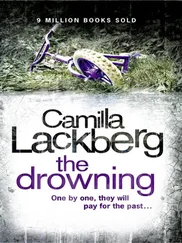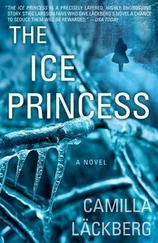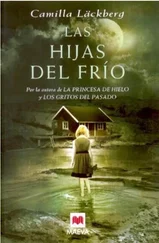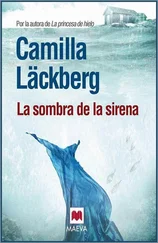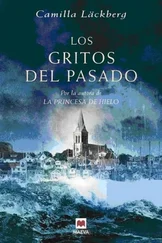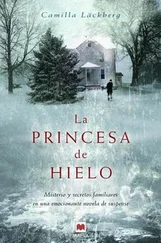Patiently Erica recounted everything that she’d learned about the four friends and the Norwegian who had come to Fjällbacka a year before the war ended. She explained that there was no trace of him after June 1945, and their efforts to track him down had got nowhere.
‘Couldn’t he have stayed in Sweden? Or gone back to Norway? Have you checked with the authorities in both countries?’ Mellberg looked extremely sceptical.
Erica got up from the floor and sat down on the other visitor’s chair. She stared at Mellberg, as if she hoped to make him take her seriously through sheer force of will. And then she told him what Herman had said to her. That Paul Heckel and Friedrich Hück should be able to tell them where Hans Olavsen was.
‘I thought the names seemed vaguely familiar, but I had no idea where I might have come across them. Until today. I went over to the cemetery to visit the graves of my parents and grandparents. And that’s when I saw it.’
‘Saw what?’ asked Mellberg, puzzled.
She waved her hand. ‘I’ll get to that, if you’ll allow me to.’
‘Sure, okay, go on,’ said Mellberg, who was starting to get interested, in spite of himself.
‘There’s a grave in the Fjällbacka cemetery that’s a little different. It’s from the First World War, and ten German soldiers are buried there – seven of them were identified and are listed by name, but three of them are unknown.’
‘You forgot to tell him about the scribbled note,’ said Patrik, who had resigned himself to taking a back seat while his wife explained things. A good man knows when it’s time to give in.
‘Oh, right. There’s one other piece to the puzzle.’ Erica told Mellberg about the page in Erik’s notebook that had caught her attention when she studied the photograph from the crime scene, and the fact that it said ‘ Ignoto militi .’
‘How did you happen to see photos from the crime scene?’ asked Mellberg angrily, glaring at Patrik.
‘We’ll discuss that later,’ said Patrik. ‘Please, just listen to what she has to say.’
Mellberg grumbled but acquiesced and indicated with a wave of his hand for Erica to continue.
‘Erik Frankel wrote those words on a notepad, over and over, and I found out what they mean. It’s an inscription on the Arc de Triomphe in Paris, or rather on the tomb of the unknown soldier. It means: “To the unknown soldier”.’
This still wasn’t making any lights go on in Mellberg’s head, so Erica continued:
‘That note stayed in the back of my mind. Here we have a Norwegian resistance fighter who disappears in 1945, and nobody knows where he went. We have Erik scribbling about an unknown soldier. And Britta talking about “old bones”, and then we have the names that Herman gave me. It was only when I walked past that grave in Fjällbacka cemetery that I suddenly realized why those names had seemed so familiar: they’re etched on the headstone.’ Erica paused to catch her breath.
Mellberg stared at her. ‘So Paul Heckel and Friedrich Hück are the names of two Germans from the First World War who are buried in a grave in Fjällbacka cemetery?’
‘That’s right,’ said Erica, pondering how she should go on with her story.
But Mellberg beat her to it. ‘So what you’re saying is…’
She took a deep breath and glanced at Patrik before she continued. ‘What I’m saying is, it’s very likely there’s an extra body in that grave. I think the Norwegian resistance fighter, Hans Olavsen, is buried there. And I’m not sure how it all fits together, but I’m convinced that’s the key to the murders of Erik and Britta.’
She fell silent. No one spoke. The only thing to be heard in Mellberg’s office was the sound of Maja and Ernst playing together.
After a moment Patrik said softly: ‘I know this sounds crazy. But I’ve discussed the whole thing with Erica, and I think there’s a lot to be said for her theory. I can’t offer any concrete proof, but all the clues we have seem to point that way. And there’s also a strong chance that Erica is right, and this is what’s behind the two murders. I don’t know how or why. But the first step is to establish whether there really is an extra body in the grave, and if so, how he died.’
Mellberg didn’t reply. He clasped his hands and sat in silence, thinking. Finally he gave a loud sigh.
‘Well, I must be out of my mind, but I think you might be right. There’s no guarantee that I’ll get permission. As I said, we have something of a track record with this type of thing, and the prosecutor is going to go through the roof. But I will try. That’s all I can promise you.’
‘That’s all we’re asking,’ said Erica eagerly, looking as though she’d like to throw her arms around Mellberg.
‘Okay, take it easy. I don’t think I’ll be successful, but I’ll do my best. And at the moment I need some peace and quiet to work.’
‘We’re leaving right now,’ said Patrik, getting to his feet. ‘Let me know as soon as you hear anything.’
Mellberg didn’t answer, just waved them out the door as he picked up the phone to start on what looked set to be the most difficult test of his persuasive abilities in his entire career.
Fjällbacka 1945
He had been living with them for six months, and they had known that they were in love for three months when disaster struck. Elsy was standing on the veranda watering her mother’s flowers when she spotted them coming up the stairs. And she understood as soon as she saw their grim expressions. Behind her in the kitchen she could heard her mother washing dishes, and part of her wanted to rush inside and make her mother leave, chase her away before she heard the news that Elsy knew she wouldn’t be able to bear. But she realized that it was futile. Instead, she walked stiffly to the front door and opened it, letting in the three men from one of the other fishing boats in Fjällbacka.
‘Is Hilma at home?’ asked the eldest of them. She knew he was the captain of the boat, and she nodded, turning to lead the way to the kitchen.
When Hilma caught sight of them, she dropped the plate she was holding and it hit the floor, shattering into a thousand pieces. ‘No, no, oh dear God, no!’ she said.
Elsy barely managed to catch her mother before she fell. She lowered her on to a chair and held her tight until it felt as if her own heart would leap out of her body. The three fishermen stood awkwardly next to the table, fumbling with the peaked caps they held in their hands. Finally the captain spoke.
‘It was a mine, Hilma. We saw everything from our boat, and we got there as fast as we could. But… there was nothing we could do.’
‘Oh dear God,’ Hilma repeated, gasping for breath. ‘What about all the others?’
Elsy was surprised that even at a moment like this her mother was able to think of the others, but then she pictured her father’s crew in her mind. The men they knew so well, and whose families were about to receive the same news.
‘There were no survivors,’ said the captain, swallowing hard. ‘We stayed there a long time, searching, but we didn’t find anyone. Only the Oscarsson boy, but he was already dead by the time we pulled him into the boat.’
Tears were running down Hilma’s face, and she bit her knuckles to keep from screaming. Elsy swallowed her own sobs and willed herself to be strong. How was her mother going to survive this? How was she herself going to survive it? Her dear, sweet father. Always ready with a kind word and a helping hand. How were they going to manage without him?
A discreet knock on the door interrupted them, and one of the messengers went to open up. Hans came into the kitchen, his face grey-tinged.
Читать дальше
Конец ознакомительного отрывка
Купить книгу




